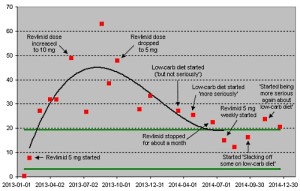The goal is to keep blood glucose low and steady and do not eat a lot of meat.
Why a ketogenic diet? Cancer cells crave glucose because they have defective mitochondria – lowering carbohydrate and protein intake and increasing fat consumption deprives cancer cells of the glucose they need. When you do not consume very many carbohydrates, your body will switch from burning glucose to burning fat for energy. (The liver metabolizes fats and produces ketone bodies) Every healthy cell in the body can use ketones for fuel, but cancer cells cannot because they have defective mitochondria.
A ketogenic diet helps in the following ways:
- Less glucose starves the tumor cells since cancer cells cannot use ketones for energy
- Less glucose does not hurt healthy cells because they CAN use ketones for fuel. In fact, when healthy cells use ketone bodies, there is less oxidative stress on them. Ketones are a “cleaner” fuel than glucose.
- when you eat a ketogenic diet, your blood glucose does not have spikes – it stays steady – which means you produce less insulin.
- Less insulin means you will produce less IGF-1
- Less IGF-1 causes a reduction in angiogenesis (fewer blood vessels which nourish the cancer cells.)
- A ketogenic diet reduces inflammation
- Ketones themselves seem to kill cancer cells!
Tumor cells lack the ability to use ketone bodies for energy. If a cancer patient limits the supply of glucose, tumor cells lose their main source of energy and will die or not grow. Ketones also seem to actually be toxic to cancer cells. The higher the ketone levels, the more reduction in cancer growth.
It took me several weeks of eating very low carb to get consistent ketone readings of .5 or above. I have gradually gotten better at this and I am back to keeping track of what I eat on “Cronometer” (a free app on line).
Protein restriction March 2015 At first, I was focused only on normalization of my glucose by eating low carb diet. As I kept researching, I found it was important to also restrict protein and increase fat. About 54% of protein consumed is converted to glucose and meat has glutamine. I found more information on why to limit protein. This research also shows that protein from plant (rather than animal) sources lowers Insulin like growth factor 1 (IGF1) which powerfully stimulates cancer. I have a scale and weigh 2 oz meat per meal. http://www.ncbi.nlm.nih.gov/pmc/articles/PMC2673798/ Protein restriction causes reduction in IGF-1 (Insulin like Growth factor). http://www.impactjournals.com/oncotarget/index.php?journal=oncotarget&page=article&op=view&path%5B%5D=1586&path%5B%5D=1756
Dietary protein restriction inhibits tumor growth “Our results showed a 70% inhibition of tumor growth in the prostate cancer model and a 56% inhibition in the WHIM16 breast cancer model fed with a 7% protein diet when compared to a 21% protein diet”
- Also my kidney function (which had been down to 20% is now up to 50%!!!).
- For those who like Math: The following formula is used to judge how much of each macronutrient is needed for ketosis: (.9 fat + .46 protein) is the ketogenic side (.1 fat + .54 protein + 1 carb) is the glucogenic side. Divide the ketogenic side by the glucogenic side to get the the ratio. so, (.9*fat +.46*protein)/(.1*fat+.54*protein+1*carb) – I try to have the ratio around 2.5.

